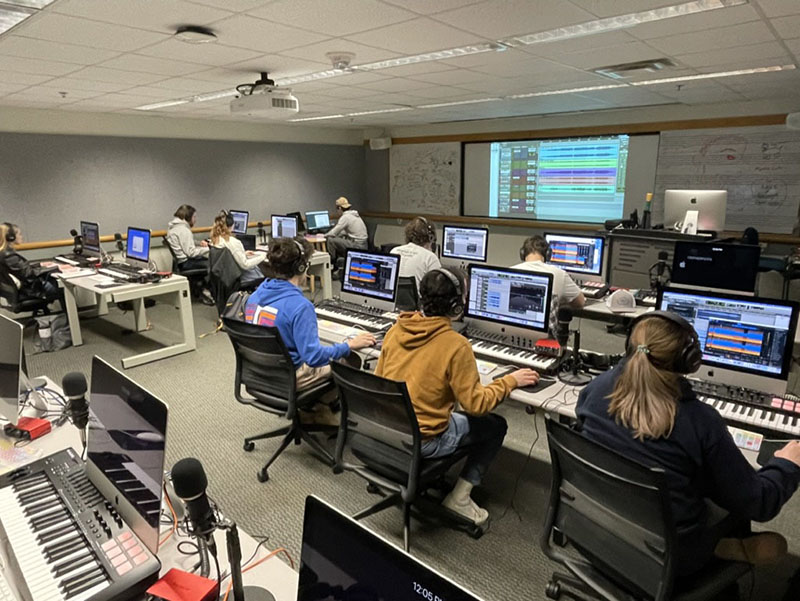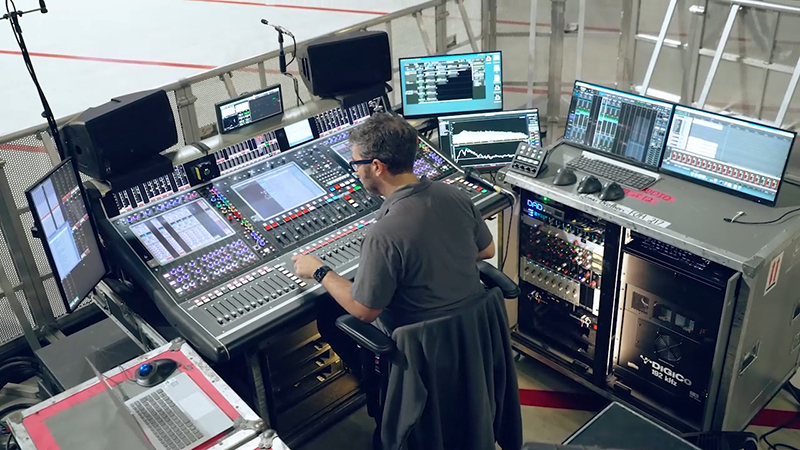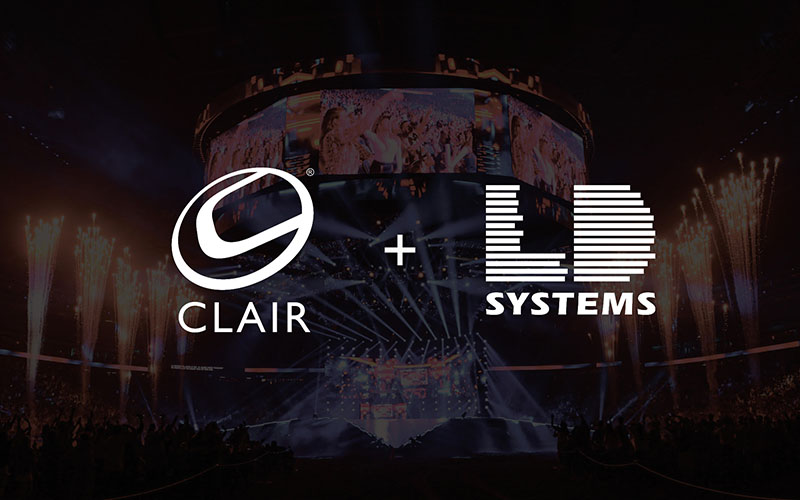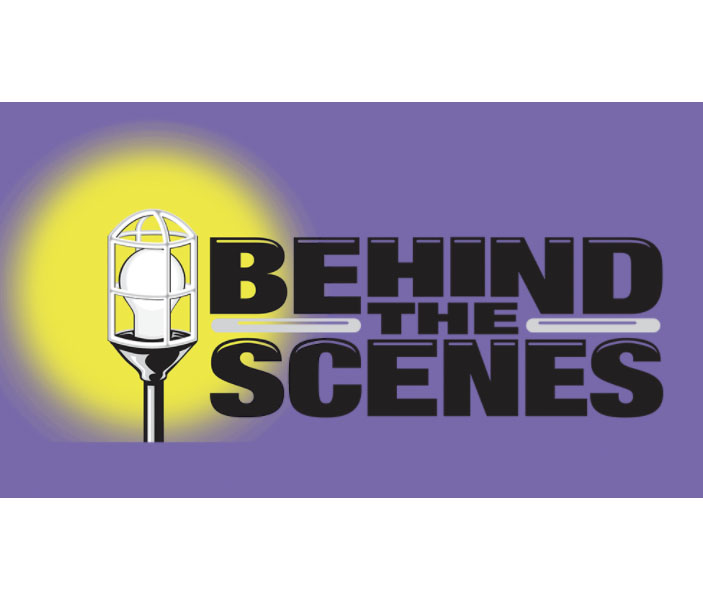
ITHACA, NY – Ithaca College Recording Services records recitals, concerts, and sessions held within the James J. Whalen Center for Music. Brian Dozoretz, manager of recording services, and Michael Caporizzo, director of sound recording technology, worked with Focusrite to streamline and upgrade the college’s recording services.
More details from Focusrite (www.focusrite.com):
Ithaca College Recording Services delivers high-quality audio recordings of recitals, concerts, and sessions held within the James J. Whalen Center for Music. These services cater to the needs of faculty, students, and the broader community, ensuring professional-level audio production for a variety of performances and events.
With more than 30 years of experience in the music recording industry, including working at the legendary Hit Factory studios in NYC, Brian Dozoretz, as Manager of Recording Services, oversees a team of 40 student employees, providing training on the latest audio software and hardware. Additionally, he manages an archive of 70+ years of concert recordings in various legacy formats. His professional roles span recording, mixing, mastering, producing, and studio management, and his work has involved collaborations with world-class artists, producers, and engineers on GRAMMY®-winning projects. Dozoretz graduated from Ithaca College’s Roy H. Park School of Communications in 1994 with a B.S. in Audio Production, as well as minors in Electroacoustic Music and Still Photography.
Michael Caporizzo is associate professor of music performance and director of the college’s bachelor of music in sound recording technology program, as well as being an active audio engineer and guitarist with a dynamic career, spanning performance, studio production and live sound. Caporizzo holds a Master of Music in Guitar Performance and a Bachelor of Music in Sound Recording Technology from Ithaca College. He has worked in studios and live music venues across the country, and he maintains an active career engineering and performing. As director of the Sound Recording Technology program, Michael teaches coursework at all levels, advises students, and oversees internships. He also emphasizes the mastery of fundamentals, problem-solving, and collaboration to prepare students for the real-world evolving music industry.
Recently, the school made a decision to move to interfaces from Focusrite as part of a major upgrade to their workflow.
“The building’s copper infrastructure, particularly the patch bays, was outdated despite a replacement 10 years ago,” stated Dozoretz. “We knew the students needed exposure to modern systems, but we had nothing to offer. One of my first upgrades, in 2007, was installing digital patch bays in key spaces, but they had served their time. As everything else was still on copper, the logical next step was moving to Dante®. Budget constraints and COVID delayed the project, but we finally secured approval.”
Focusrite’s Dr. Lee Whitmore, Vice President B2B & Education, Americas, gives background on the relationship between Focusrite and Ithaca College: “When we first connected with the campus, they were facing a significant challenge: recording and archiving 500 performances and events each year for the School of Music using outdated copper infrastructure. After trialing our portable RedNet rack for education, they made the decision to upgrade to RedNet this year.”
Focusrite’s RedNet is a series of high-quality audio interfaces and converters that utilize Dante audio-over-IP networking technology. Designed for professional applications such as recording studios, live sound, broadcast, and post-production, RedNet offers a modular and scalable approach to building audio systems. The range includes remote-controlled mic preamps, advanced A-D and D-A converters, and various interfaces for seamless integration with digital audio workstations and other equipment. By leveraging Dante’s flexibility, RedNet enables the transmission of multiple channels of uncompressed, low-latency digital audio over standard Ethernet networks.
Dozoretz outlines part of the reason to move to Focusrite RedNet interfaces: “The initial motivation came from the fact that our concert, performance, and rehearsal halls have had permanently mounted microphones for a quarter of a century. These mics are connected to local preamps, with signal distribution to multiple destinations. Over time, as usage increased, we began pushing the limits of this setup, risking failures, or having mis-patches affect other users. To solve this, we decided to move the microphone preamps to Dante. We chose the MP8Rs, installed them across our facilities, and adjusted the signal routing accordingly. After discussions and revisions, we implemented the solution widely, including an XP2 unit in a smaller room that only requires two microphones.” He continues, “We installed MP8Rs in most spaces to allow for additional microphones. I designed the system with redundancy, so regardless of where you’re recording, the equipment, patch bay, and speakers are the same—only the physical location changes. We then focused on the backend for Dante signal reception, choosing the RedNet series for consistency. This setup ensures students can easily switch between units, like a Red 8Line and a Red 16Line, without needing to relearn the system.”
Dozoretz remarks that, with the system now fully integrated, even non-engineers such as school and program heads have noticed and commented, “Why do all our recordings sound so much better?” With the success of RedNet, the school is expanding its deployment by introducing Focusrite Scarlett Solo Gen 4 interfaces in their music tech lab. The positive reception from teachers, administrators, and students alike speaks to the quality of the Focusrite setup.
“The biggest surprise for us was the unexpected improvement in sound quality,” stated Dozoretz. “Initially, the focus was on connectivity and the experience of using Dante. However, once everything was set up, the hall’s mounted microphones, used for various functions—web streaming, self-serve recording by ensemble directors, and student recordings—began to deliver noticeably better sound. My colleagues and I were amazed by the difference, as were the end users. Although we knew what caused the improvement, we hadn’t anticipated it being so significant.”
Working closely with Dozoretz, as part of his teaching curriculum, Michael Caporizzo oversees students with the college’s Audinate Dante and RedNet Certification programs beginning their freshmen year. As part of Ithaca’s four-year bachelor of music recording program, in the second semester, the students are learning microphone techniques and multi-track recording in the school’s flagship Borg Warner studio, which is equipped with a 48-channel SSL Duality console along with multiple Focusrite RedNet A16R MkII and HD32R units in order to expand well beyond the analog channel limit of the console. “The students are learning analog workflow, but everything is passed over our Dante network, both to and from the console,” stated Caporizzo. “So they can learn the Dante side of that workflow and RedNet. And then in the spring semester, it’s some continued work, but using our other space, which is now a 7.1.4 immersive room. So, they start to learn some mixing, and there’s a live sound segment in that semester too. In the third year, students focus on Advanced Microphone Techniques, engaging in extensive recording and project-based work. They also begin incorporating Dolby Atmos® into their projects, made possible by the Red 16 and R1 system in our second control room. While the primary control room is a 5.1 room due to the SSL console, the second control room, which lacks an analog console, serves as the immersive space. Here, students learn Dolby Atmos, along with some exposure to Sony 360, though the emphasis is primarily on Atmos. The calibration for the Atmos system is also integrated into a Dante-based setup, allowing students to deeply explore routing.”
At that stage, students must thoroughly understand Dante and the relationship between the RedNet R1 and the Red 16. During the spring semester of their third year, the focus shifts toward mixing and post-production. While the first semester emphasizes capture, the second semester centers on post-production techniques. By this time, students have earned certifications in Avid Pro Tools, Dante, RedNet, and other relevant systems encountered along the way. They also take an internship preparation course and complete an internship during the summer between their junior and senior year. The senior year primarily focuses on their senior project.”
Caporizzo gives an example of elements a senior project that is currently taking place: “This week, a student recorded a wind ensemble in an immersive format, using a nine-channel array along with height microphones to highlight a specific section in the mix. The project is divided into four parts: one focusing on a traditional recording approach, another on contemporary production with minimal overdubs and no technical limitations, and additional elements to complete the work. It’s a comprehensive project with a lot of components.”
The school has also employed Novation Launchpad MK2’s from the Focusrite Group. Dozoretz explains, “We installed 15 Launchpads in our training labs, with each instructor having one as well. They’re currently available for students to experiment with, and we foresee more extensive use of these devices in the MIDI sections of the curriculum in the future. All systems are equipped with Avid Pro Tools, Apple Logic, and Ableton Live, and students use the controllers across all three platforms during non-class times, exploring as they wish. We assist with any questions or issues that arise.”
Dozoretz reflects on the increased connectivity, and the ways in which Focusrite components have enhanced the learning tracks of the students: “We’re excited that the rest of the campus is coming online. We recently added another MP8R to our main performance theater, which is across campus. Previously, we had to haul a portable rack of interfaces and laptops, often in bad weather, making it a hassle. Now, I can monitor and record performances, like the opera, directly from my office. It’s also a major enhancement for students—they can record from anywhere with ease. Additionally, we purchased several AM2 units to enhance the setup. The AM2 units have been a game-changer. Previously, students had to set up custom racks and Ethernet connections in various spaces. Now, they can just drop an AM2, plug it into an Ethernet port, and they’re ready to go. While we expected that convenience, the real surprise came with larger ensembles. Many need a click track or the conductor needs to hear electronic instruments, but stage monitors can interfere with recordings. Now, we can simply place an AM2 on stage, taking advantage of Ethernet ports, we installed during the concert hall renovation 10years ago.”
Both Caporizzo and Dozoretz feel it’s imperative for the college to stay current with what is going on in the industry for their students to learn and get the training they need, so upon graduation, they can go out into the world with real-world knowledge and experience that will get them the jobs they are looking for. Caporizzo summed it up by saying, “It’s challenging for academia to keep pace with the rapidly evolving industry, but we strive to stay as current as possible. This Focusrite system has propelled us 15 years ahead of where we were. Once it became clear that both Dante and immersive audio were here to stay, we had to figure out how to adapt. The RedNet system was a turning point, enabling us to fully embrace these technologies and remain aligned with where we believe the industry is headed.”
Dozoretz echoes Caporizzo’s thoughts: “The relationship with Focusrite has been nothing but fantastic, and their products have been transformative for the school. Teaching technology is challenging because it evolves so quickly. We’re incredibly grateful for this system because it allows us to go beyond teaching just the technology of today. It feels like we’ve gained the flexibility to adapt to future advancements and avoid being stuck in the present moment.”



